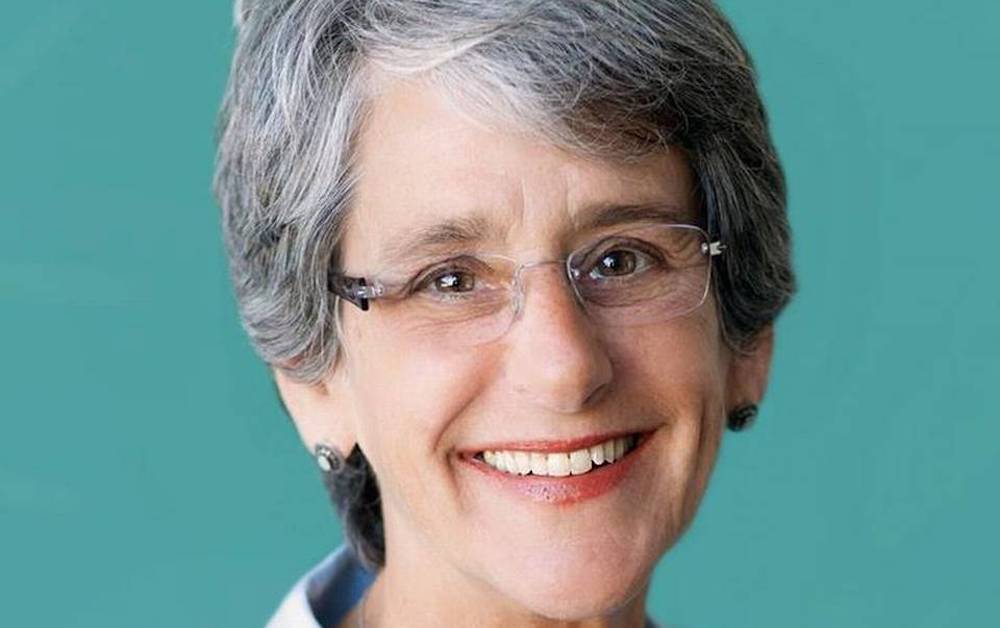
Hannah-Beth Jackson is a member of the California State Senate representing the 19th District (Santa Barbara County and most of Ventura County), and author of Senate Bill 358, the California Fair Pay Act, legislation that established the strongest equal pay law in the country. Before taking part in “Why Don’t Women’s Votes Put More Women in Power?,” the second event in the When Women Vote series presented by Zócalo and the Natural History Museum of Los Angeles County, Jackson stopped by the virtual green room to discuss what she was like when she was 15, what’s on her reading list, and taking lessons with Hazel Wightman, the “Queen Mother of American Tennis.”
If you were a fruit, what fruit would you be?
How about a blueberry? Blueberries are colorful. They’re healthy. You can go into nature and pick them yourself without a whole lot of hassle.
You’re known today for your ambitious political career, but how would your friends have described you when you were 15?
Outspoken, passionate … a pain in the neck.
What’s the last good book you’ve read?
The Underground Railroad by Colson Whitehead. It’s compelling, well written, and extremely consciousness-raising and disconcerting. It’s very appropriate at this moment in time as we’re being forced to look in that mirror and recognize how deeply racism is embedded in our society.
I’ve got two books open now, and not enough time to read them. One of them is The Devil in the White City. I am a reader of books on World War II. I marvel about reading about ordinary people doing extraordinary things. It’s a reminder, too, that all we’re being asked to do this pandemic is wear a damn mask and socially distance. But that’s neither here nor there. I’m also reading All the Light We Cannot See, about a young blind woman in France during World War II. And the one I just completed before that was The Tattooist of Auschwitz. To read about people who rose above their basic fears to help humanity is just really inspiring to me.
Where do you come up with your best ideas?
Frequently in the shower—or from 2 to 4 a.m.
Is that when you’re going to bed or waking up?
That’s waking up. Not a good thing, but hopefully now that I’m winding down in my legislative career, I’ll be able to sleep longer and better.
What’s something that you have no patience for?
People who don’t try. I have very little patience for that. To me, failure happens only if you don’t try. That’s the definition of failure. And I have little patience for people who don’t try.
If you could time travel anywhere, where would you go?
I don’t think I want to go forward because I’m afraid of what the future’s going to look like. I would probably travel back to the American Revolution, to the creation of our Constitution and the Bill of Rights. To be part of or to listen to or to observe the emergence of this notion called democracy. That would be incredibly inspiring.
Who’s inspired you?
My tennis coach Hazel Wightman. She was an amazing woman. We first met when she was 75. She won her first national tennis championship in 1909, and her last championship in 1954, and in between, raised five children and was one of the first women to graduate from the University of California. Her parents came over to California in a covered wagon from Pennsylvania. She was just a force of nature.
How did you meet?
She was teaching tennis in her garage in Boston when I took up the game because girls weren’t allowed to play Little League, and I loved sports. I became her pupil and that started my tennis career. She was born in 1886 in Healdsburg, California, and died in 1974 in Chestnut Hill, Massachusetts, right near my hometown. Her house was replete with all of these silver trophies that she won throughout the course of her career. She dominated women’s tennis before World War I and was known as the “Queen Mother of American Tennis.” She was an extraordinarily influential woman in many respects, a strong feminist without calling herself a feminist. Her house was the place where so many of the players of the day would come and stay. I met people like Billie Jean King, Rosie Casals…
Is there any spot in Santa Barbara or Ventura that you’ve been frequenting during this period of isolation?
I’ve been trying very hard to stay at home. Occasionally, I’ll take a walk along the beach, but I basically am enjoying the comforts of my little plot of green grass–actually it’s not very green any more. My plot of indigenous plants, drought-tolerant plants. Right now, I’m looking outside at a squirrel who’s playing on one of my favorite trees. Trying to figure out how to get rid of the gophers that are chewing up the yard. And tending to my rose garden. That’s life today.



